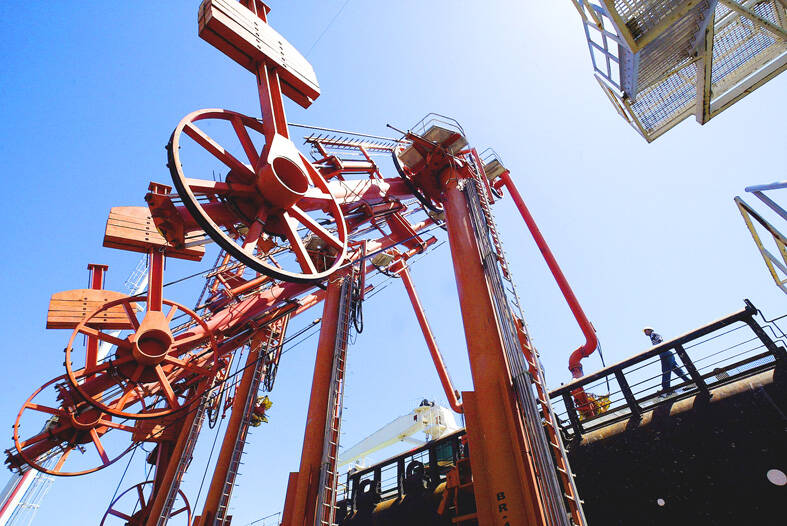Venezuela has awarded a stake in a key oil joint venture to a little-known firm called GazMin International Group almost six months after seizing it from Russian executives, people with direct knowledge of the matter said.
Gazmin now has a 40 percent holding in Petrozamora SA, while state oil company Petroleos de Venezuela SA holds the other 60 percent, said the people, who asked not to be identified as the decision has not been formally announced.
The minority stake was previously owned by GPB Global Resources, a closely held energy firm founded by former Gazprom PJSC officials, the people said.

Photo: Reuters
Venezuelan President Nicolas Maduro’s government in September last year took over Petrozamora in the hopes of controlling its exports directly, the people said.
At the time, GPB called the move an “illegal asset expropriation.”
Gazmin says on its Web site that it is based in the United Arab Emirates and Kuwait.
Some of its partners are Venezuelan nationals, the people said.
The United Arab Emirates’ federal registry shows a firm named GazMin was formed in September 2019, although it is not clear if that’s the same entity doing business in Venezuela. PDVSA and GPB did not respond to requests for comment.
The changes in ownership follow a tumultuous time for the global oil market and Venezuela’s place in it. The country has lost out to cheaper Russian crude in the Chinese market, which in preceding years has been one of the biggest buyers of oil from the South American nation. Russian oil has been sold at a discounted price amid efforts by the US and other G7 nations to curb Moscow’s energy revenues.
That is not the only recent change for Venezuelan exports. Chevron Corp is now able to export from the country to the US after the easing of sanctions targeting the Maduro government. Venezuela could soon be sending more oil to the US than Persian Gulf producers Kuwait and Libya combined.
Prior to US sanctions, Petrozamora was one of the most productive oil ventures in Venezuela, with all of its crude going to Europe.
Meanwhile, oil fell as macroeconomic headwinds dominate the market, while traders wait and see how demand pans out.
West Texas Intermediate for April delivery on Friday rose 1.27 percent to US$76.68 a barrel, but declined 3.77 percent this week amid fears that recent economic data would impel the US Federal Reserve to more aggressively raise interest rates, compounding pressure from China’s tempered economic projections.
Brent crude for April delivery gained 1.46 percent to US$82.78 a barrel, but posted a weekly loss of 3.55 percent.
Any bulls looking for a bump in prices from the supply side have so far been disappointed by resilient flows from Russia counteracting recent concerns of the longevity of the growth in US supply.
“Risk appetite is dominating as crude traders shy away from substantially increasing their positioning with prices locked into a tight range,” TD Securities commodity strategist Daniel Ghali, said.
Additional reporting by staff writer

Merida Industry Co (美利達) has seen signs of recovery in the US and European markets this year, as customers are gradually depleting their inventories, the bicycle maker told shareholders yesterday. Given robust growth in new orders at its Taiwanese factory, coupled with its subsidiaries’ improving performance, Merida said it remains confident about the bicycle market’s prospects and expects steady growth in its core business this year. CAUTION ON CHINA However, the company must handle the Chinese market with great caution, as sales of road bikes there have declined significantly, affecting its revenue and profitability, Merida said in a statement, adding that it would

RISING: Strong exports, and life insurance companies’ efforts to manage currency risks indicates the NT dollar would eventually pass the 29 level, an expert said The New Taiwan dollar yesterday rallied to its strongest in three years amid inflows to the nation’s stock market and broad-based weakness in the US dollar. Exporter sales of the US currency and a repatriation of funds from local asset managers also played a role, said two traders, who asked not to be identified as they were not authorized to speak publicly. State-owned banks were seen buying the greenback yesterday, but only at a moderate scale, the traders said. The local currency gained 0.77 percent, outperforming almost all of its Asian peers, to close at NT$29.165 per US dollar in Taipei trading yesterday. The

RECORD LOW: Global firms’ increased inventories, tariff disputes not yet impacting Taiwan and new graduates not yet entering the market contributed to the decrease Taiwan’s unemployment rate last month dropped to 3.3 percent, the lowest for the month in 25 years, as strong exports and resilient domestic demand boosted hiring across various sectors, the Directorate-General of Budget, Accounting and Statistics (DGBAS) said yesterday. After seasonal adjustments, the jobless rate eased to 3.34 percent, the best performance in 24 years, suggesting a stable labor market, although a mild increase is expected with the graduation season from this month through August, the statistics agency said. “Potential shocks from tariff disputes between the US and China have yet to affect Taiwan’s job market,” Census Department Deputy Director Tan Wen-ling

UNCERTAINTIES: The world’s biggest chip packager and tester is closely monitoring the US’ tariff policy before making any capacity adjustments, a company official said ASE Technology Holding Inc (日月光投控), the world’s biggest chip packager and tester, yesterday said it is cautiously evaluating new advanced packaging capacity expansion in the US in response to customers’ requests amid uncertainties about the US’ tariff policy. Compared with its semiconductor peers, ASE has been relatively prudent about building new capacity in the US. However, the company is adjusting its global manufacturing footprint expansion after US President Donald Trump announced “reciprocal” tariffs in April, and new import duties targeting semiconductors and other items that are vital to national security. ASE subsidiary Siliconware Precision Industries Co (SPIL, 矽品精密) is participating in Nvidia